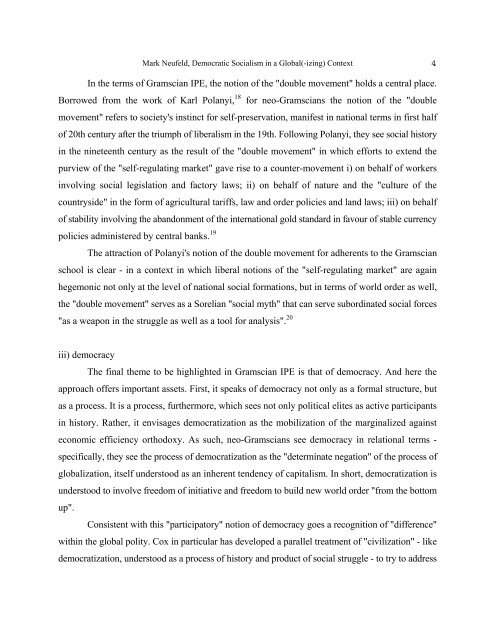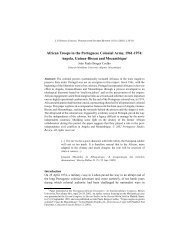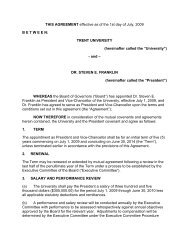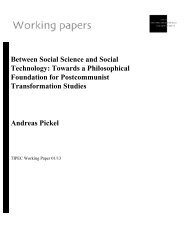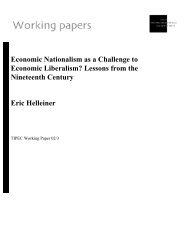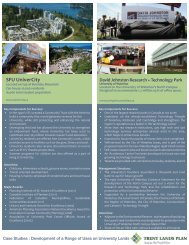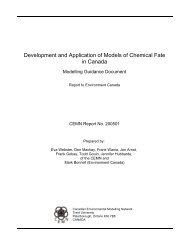Mark Neufeld, Democratic Socialism in a Global ... - Trent University
Mark Neufeld, Democratic Socialism in a Global ... - Trent University
Mark Neufeld, Democratic Socialism in a Global ... - Trent University
Create successful ePaper yourself
Turn your PDF publications into a flip-book with our unique Google optimized e-Paper software.
<strong>Mark</strong> <strong>Neufeld</strong>, <strong>Democratic</strong> <strong>Socialism</strong> <strong>in</strong> a <strong>Global</strong>(-iz<strong>in</strong>g) Context 4<br />
In the terms of Gramscian IPE, the notion of the "double movement" holds a central place.<br />
Borrowed from the work of Karl Polanyi, 18 for neo-Gramscians the notion of the "double<br />
movement" refers to society's <strong>in</strong>st<strong>in</strong>ct for self-preservation, manifest <strong>in</strong> national terms <strong>in</strong> first half<br />
of 20th century after the triumph of liberalism <strong>in</strong> the 19th. Follow<strong>in</strong>g Polanyi, they see social history<br />
<strong>in</strong> the n<strong>in</strong>eteenth century as the result of the "double movement" <strong>in</strong> which efforts to extend the<br />
purview of the "self-regulat<strong>in</strong>g market" gave rise to a counter-movement i) on behalf of workers<br />
<strong>in</strong>volv<strong>in</strong>g social legislation and factory laws; ii) on behalf of nature and the "culture of the<br />
countryside" <strong>in</strong> the form of agricultural tariffs, law and order policies and land laws; iii) on behalf<br />
of stability <strong>in</strong>volv<strong>in</strong>g the abandonment of the <strong>in</strong>ternational gold standard <strong>in</strong> favour of stable currency<br />
policies adm<strong>in</strong>istered by central banks. 19<br />
The attraction of Polanyi's notion of the double movement for adherents to the Gramscian<br />
school is clear - <strong>in</strong> a context <strong>in</strong> which liberal notions of the "self-regulat<strong>in</strong>g market" are aga<strong>in</strong><br />
hegemonic not only at the level of national social formations, but <strong>in</strong> terms of world order as well,<br />
the "double movement" serves as a Sorelian "social myth" that can serve subord<strong>in</strong>ated social forces<br />
"as a weapon <strong>in</strong> the struggle as well as a tool for analysis". 20<br />
iii) democracy<br />
The f<strong>in</strong>al theme to be highlighted <strong>in</strong> Gramscian IPE is that of democracy. And here the<br />
approach offers important assets. First, it speaks of democracy not only as a formal structure, but<br />
as a process. It is a process, furthermore, which sees not only political elites as active participants<br />
<strong>in</strong> history. Rather, it envisages democratization as the mobilization of the marg<strong>in</strong>alized aga<strong>in</strong>st<br />
economic efficiency orthodoxy. As such, neo-Gramscians see democracy <strong>in</strong> relational terms -<br />
specifically, they see the process of democratization as the "determ<strong>in</strong>ate negation" of the process of<br />
globalization, itself understood as an <strong>in</strong>herent tendency of capitalism. In short, democratization is<br />
understood to <strong>in</strong>volve freedom of <strong>in</strong>itiative and freedom to build new world order "from the bottom<br />
up".<br />
Consistent with this "participatory" notion of democracy goes a recognition of "difference"<br />
with<strong>in</strong> the global polity. Cox <strong>in</strong> particular has developed a parallel treatment of "civilization" - like<br />
democratization, understood as a process of history and product of social struggle - to try to address


